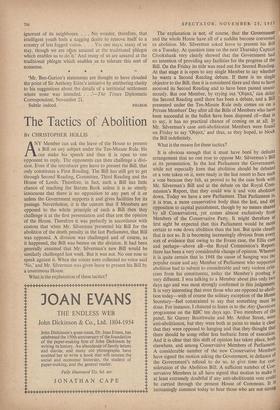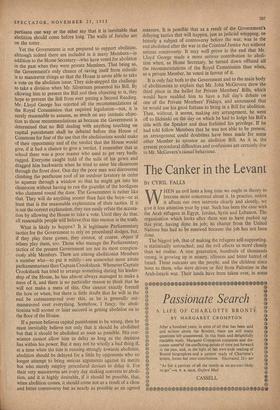The Tactics of Abolition
BY CHRISTOPHER HOLLIS NY Member can ask the leave of the House to present a Bill on any subject under the Ten-Minute Rule. He can make his speech and then it is open to one opponent to reply. The opponents can then challenge a divi- sion. Even if the introducer gets leave to present the Bill, that only constitutes a First Reading. The Bill has still got to get through Second Reading, Committee, Third Reading and the House of Lords. Therefore, in fact, such a Bill has little chance of reaching the Statute Book unless it is so utterly innocuous that there is no opposition to any part of it or unless the Government supports it and gives facilities for its passage. Nevertheless, it is the custom that if Members are Apposed to the whole principle of such a Bill then they challenge it at the first presentation and thus test the opinion of the House. Therefore it was perfectly in accordance with custom that when Mr. Silverman presented his Bill for the abolition of the death penalty in the last Parliament, that Bill was opposed. A division was challenged and of course, as it happened, the Bill was beaten on the division. It had been generally assumed that Mr. Silverman's new Bill would be similarly challenged last week. But it was not. No one rose to speak against it. When the voices were collected no voice said `No,' and Mr. Silverman was given leave to present his Bill.by a unanimous House.
What is the explanation of these tactics? The • explanation is not, of course, that the Government and the whole House have all of a sudden become converted to abolition. Mr. Silverman asked leave to present his Bill on a Tuesday. At question time on the next Thursday Captain Crookshank very clearly showed that the Government had no intention of providing any facilities for the progress of the Bill. On the Friday its title was read out for Second Reading. At that stage it is open to any single Member to say whether he wants a Second Reading debate. If there is no single objector to the Bill, then it is considered there and then to have received its Second Reading and to have been passed unant' mously. But one Member, by crying out 'Object,' can delay the Second Reading until there has been a debate, and a Bill presented under the Ten-Minute Rule' only comes on on a Private Members' Day after all the Bills of Members who have been successful in the ballot have been disposed of—that is to say, it has no practical chance of coming on at all. In Mr. Silverman's case anti-abolitionist Members were found on Friday to say 'Object,' and thus, as they hoped. to block the Bill indefinitely.
What is the reason for these tactics?
It is obvious enough that it must have been by definite arrangement that no one rose to oppose Mr. Silverman's Bill at its presentation. In the last Parliament the Government. while not especially keen that abolition should be debated or a vote taken on it, were ready in the last resort to face such a vote because they felt, as proved to be the case both with Mr. Silverman's Bill and at the debate on the Royal Coin' mission's Report, that they could win it and vote abolition down. Today we have, a new Parliament. That Parliament is, it is true, a more conservative body than the last, and the opposition to capital punishment, though by no means shared by all Conservatives, yet comes almost exclusively froth Members of the Conservative Party. It might therefore at first sight be expected that this Parliament would be more certain to vote down abolition than the last. But quite clearly that is not so. It is becoming increasingly obvious from every sort of evidence that owing to the Evans case, the Ellis case and perhaps—above all—the Royal Commission's Report. there has been a very considerable change of opinion. Whereas it is quite certain that in 1948 the cause of hanging was the popular cause and any Member of Parliament who supported abolition had to submit to considerable and very violent criti• cism from his constituents, today the Member's postbag is very different. I was talking to a Member about this only two days ago and was most strongly confirmed in this judgement. It is very interesting that even those who are opposed to aboli• tion today—with of course the solitary exception of the Home Secretary—feel constrained to say that something must be done. For instance, I chanced to listen in to the Any Questions programme on the BBC ten days ago. Two members of the panel, Sir Gurney Braithwaite and Mr. Arthur Street, were anti-abolitionist, but they were both at pains to make it clear that they were opposed to hanging and that they thought that there should be somp other less barbaric form of execution. And it is clear that this shift of opinion has taken place, both elsewhere, and among Conservative Members of Parliament. A considerable number of the. new Conservative Members have signed the, motion asking the Government, in defiance of the Government's refusal to do so, to give time for con' sideration of the Abolition Bill. A sufficient number of Con' servative Members in all have signed that motion to make it at least extremely doubtful if any anti-abolitionist vote could be carried through the present House of Commons. It is increasingly common today to hear those who are not strong partisans one way or the other say that it isinevitable that abolition should come before long. The walls of Jericho are on the totter.
Yet the Government is not prepared to support abolition, although indeed there are included in it many Members—in addition to the Home Secretary—who have voted for abolition in the past when they were private Members. That being so, the Government's only chance of saving itself from ridicule is to manoeuvre things so that the House is never able to take a vote on the abolition issue. They side-stepped the challenge to take a division. when Mr. Silverman presented his Bill. By allowing him to present the Bill and then objecting to it, they hope to prevent the Bill from ever getting a Second Reading. Mr. Lloyd George has rejected all the recommendations of the Royal Commission that required legislation—not, it is surely reasonable to assume, so much on any intrinsic objec- tion to those recommendations as because the Government is determined that no Bill dealing with anything touching on capital punishment shall be debated before this House of Commons for fear of the use that the abolitionists would make of their opportunity and of the verdict that the House would give, if it had a chance to give a verdict. I remember that at school there was a poor master who used to get very badly ragged. Everyone caught hold of the tails of his gown and dragged him backwards when he tried to enter his classroom through the front door. One day the poor man was discovered climbing the penthouse roof of an outdoor lavatory in order to squeeze through a window so that he might get into his classroom without having to run the gauntlet of the hooligans who clustered round the door. The Government is rather like that. They will do anything sooner than face the boys—or at least that is the reasonable explanation of their tactics. If it is not the correct explanation, they can easily refute the accusa- tion by allowing the House to take a vote. Until they do that, all reasonable people will believe that this version is the truth.
What is likely to happen? It is legitimate Parliamentary tactics for the Government to rely on procedural dodges, but, if they play these games, they cannot, of course, object if others play them, too. Those who manage the Parliamentary tactics of the present Government are not its most conspicu- ously able Members. There are among abolitionist Members a number who—to put it mildly—are somewhat more astute parliamentarians than Captain Crookshank. Whenever Captain Crookshank has tried to arrange something during his leader- ship of the House, he has almost always managed to make a mess of it, and there is no particular reason to think that he will not make. a mess of this. One cannot exactly foretell the how or when, but there is little doubt that he will in the end be outmanoeuvred over this. as he is generally out- manoeuvred over everything. Somehow, I fancy, the aboli- tionists will sooner or later succeed in getting abolition on to the floor of the House.
If a person believes capital punishment to be wrong, then he must inevitably believe not only that it should be abolished but that it should be abolished as soon as possible. His con- science cannot allow him to delay so long as the decision lies within his power. But it may not be wholly a bad thing if, at a time when the tide is running strongly towards abolition, abolition should be delayed fOr a little by opponents who no longer attempt to bring serious arguments against its merits but who merely employ procedural devices to delay it. For their very manoeuvres are every day making converts to aboli- tion, and it is highly desirable, if it should be possible, that, when abolition comes, it should come not as a result of a close and bitter controversy but as nearly as possible as an agreed measures It is possible that as a result of the Government's delaying tactics that will happen, just as judicial whipping, so bitterly a subject of controversy before the war, was in the end abolished after the war in the Criminal Justice Act without serious controversy. It may well prove in the end that Mr. Lloyd George made a more serious contribution to aboli- tion when, as Home Secretary, he turned down offhand all the recommendations of the Royal Commission than when. as a private Member, he voted in favour of it.
It is only fair both to the Government and to the main body of abolitionists to explain that Mr. John McGovern drew the third place in the ballot for Private Members' Bills, which would have enabled him to have a full day's debate on one of the Private Members' Fridays, and announced that he would use his good fortune to bring in a Bill for abolition. Then, without, it seems, making any arrangement, he went off to Helsinki on the day on which he had to lodge his Bill's title with the Speaker and thus forfeited his privilege. If he had told fellow Members that he was not able to be present. an arrangement could doubtless have been made for some other Member to sponsor an abolition Bill. As it is, the present procedural difficulties and confusions are certainly due to Mr. McGovern's casual behaviour.



























































 Previous page
Previous page